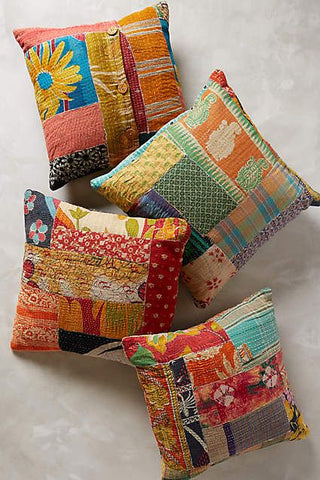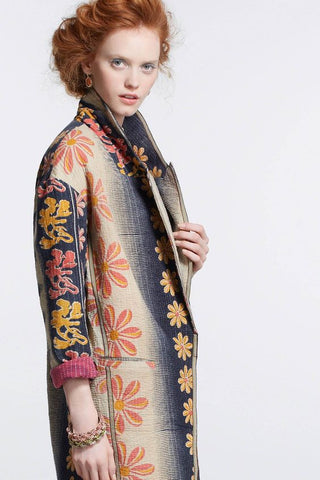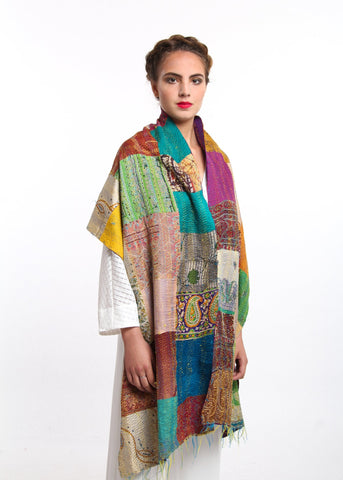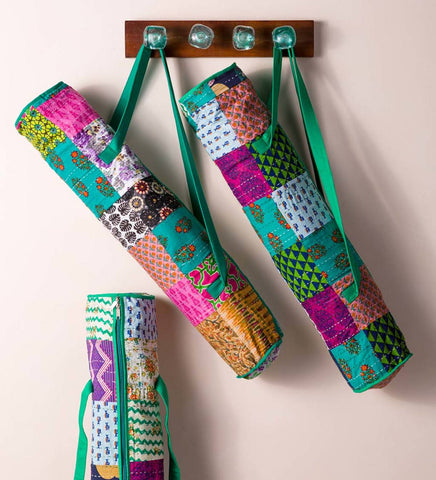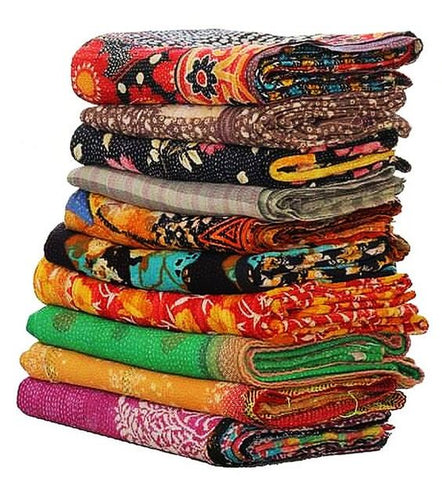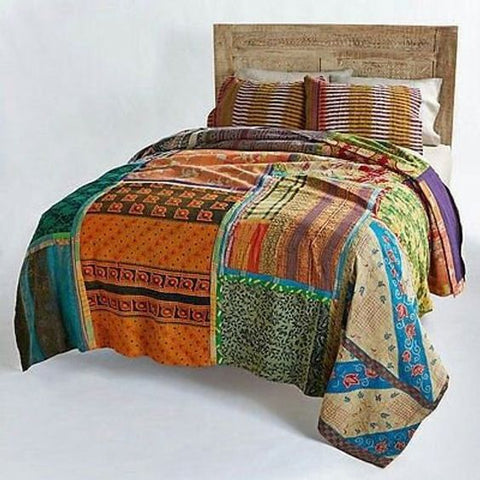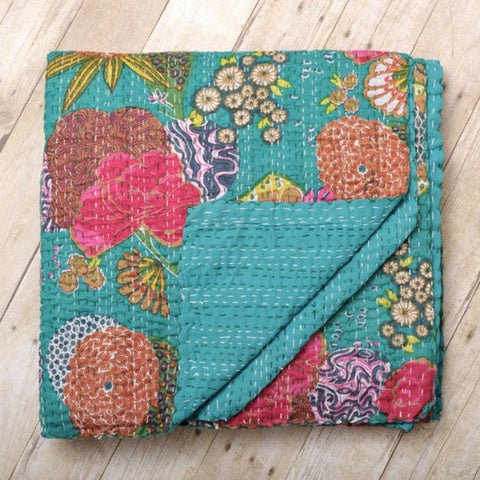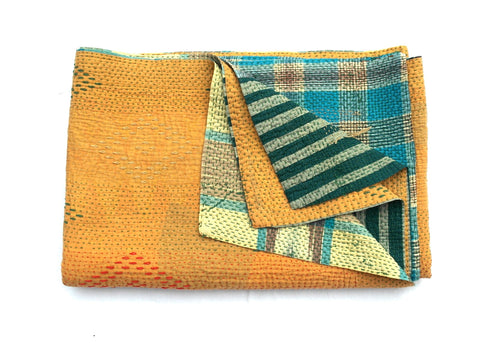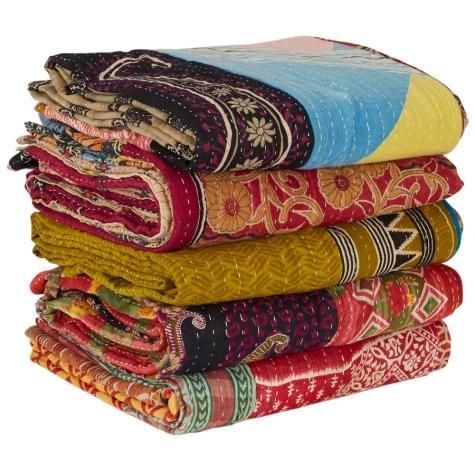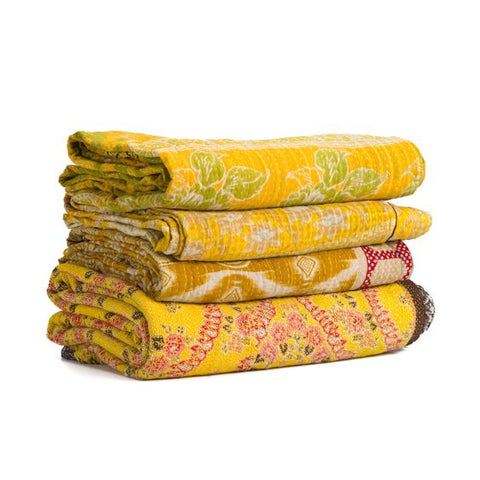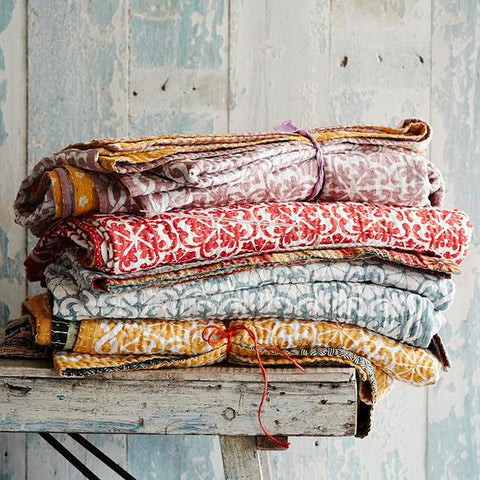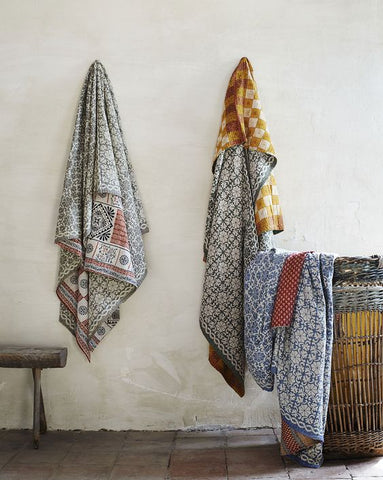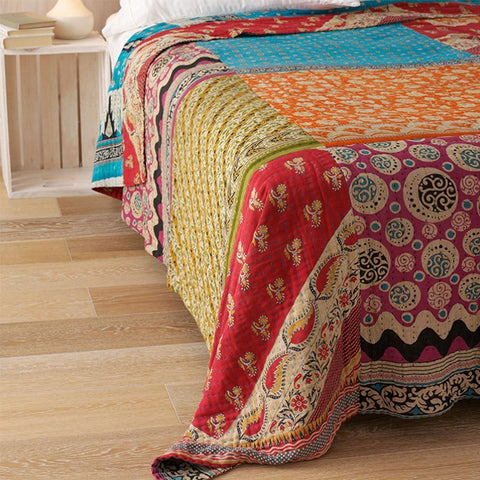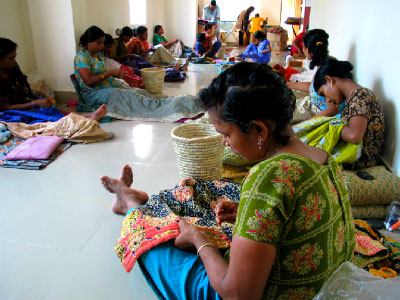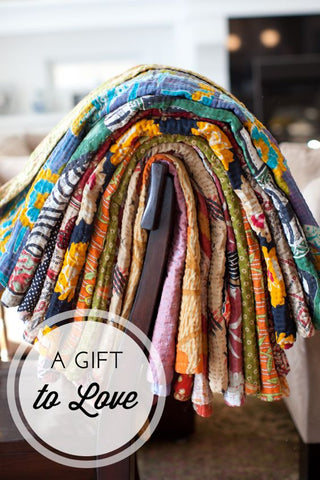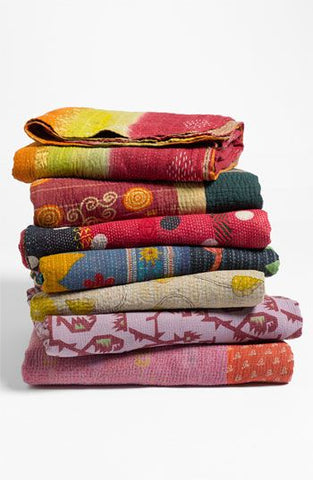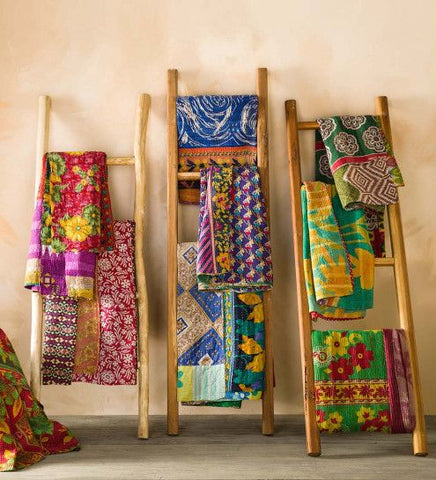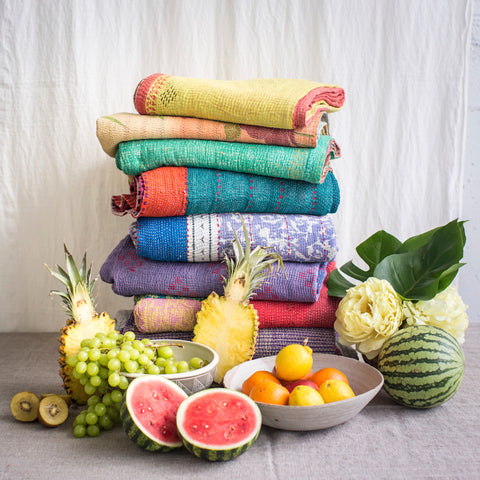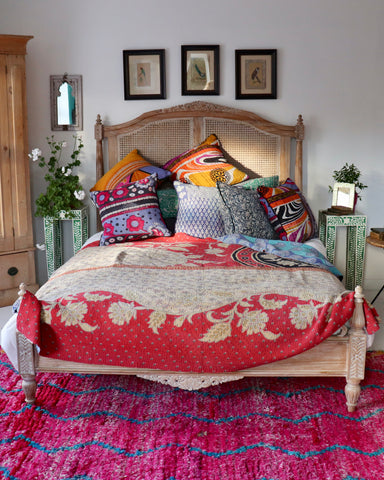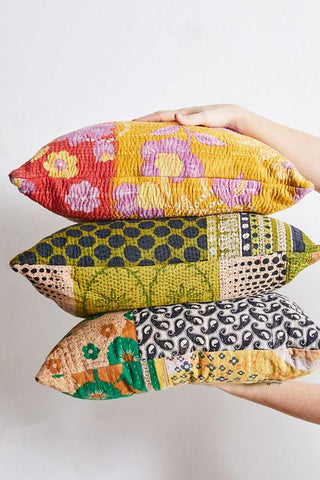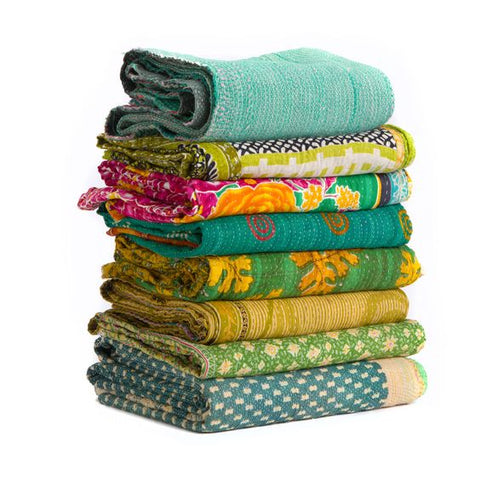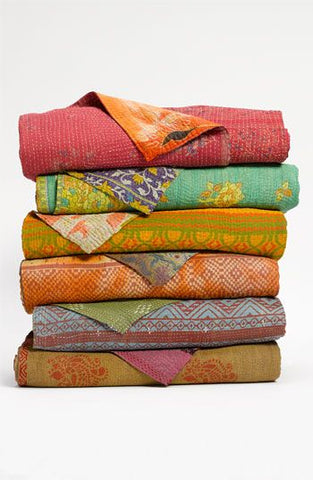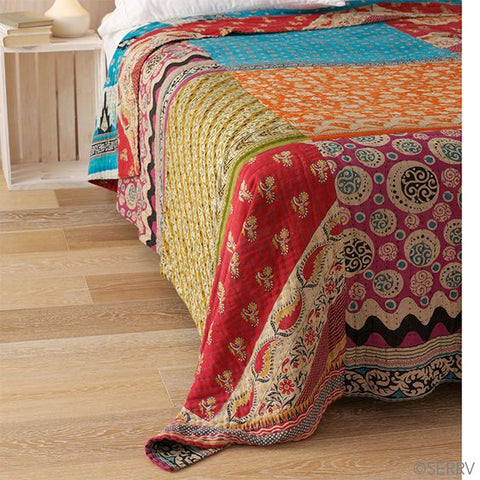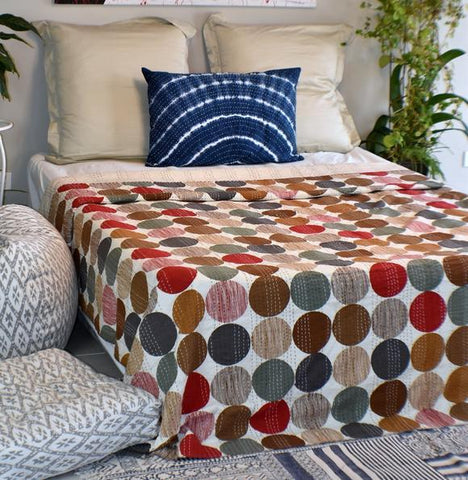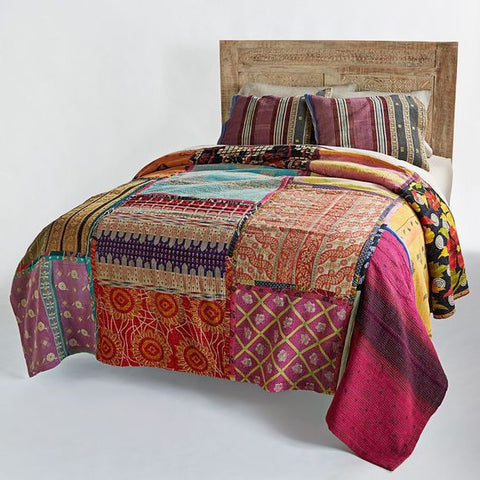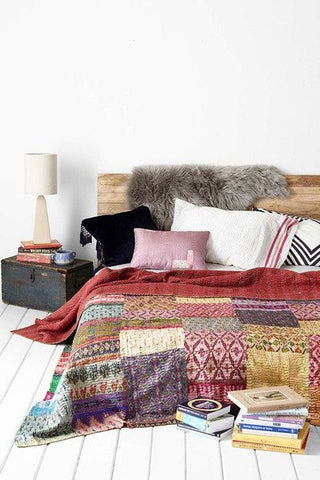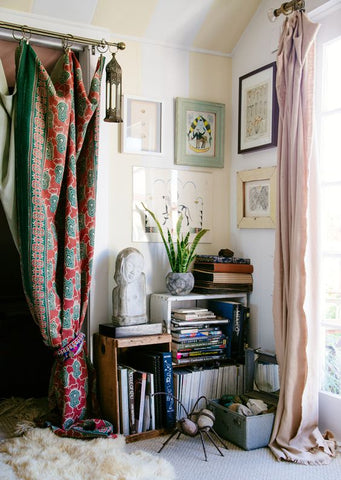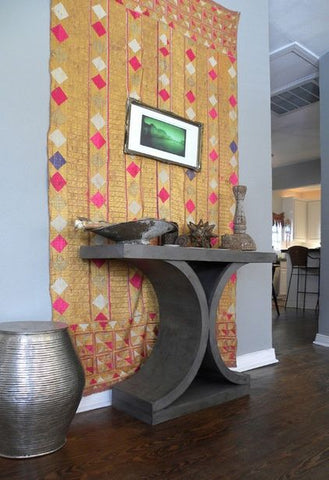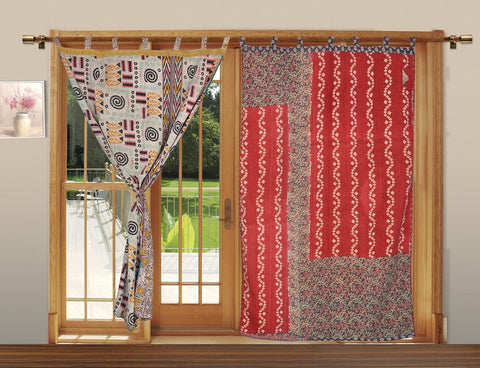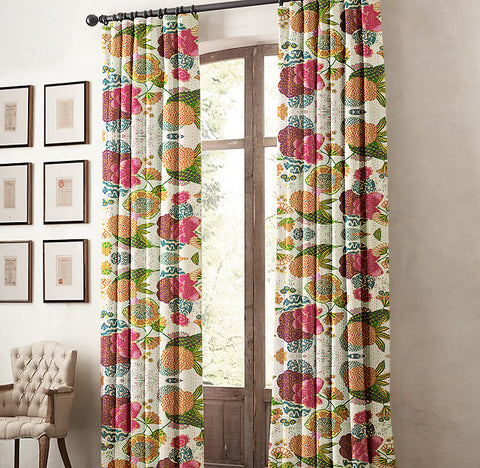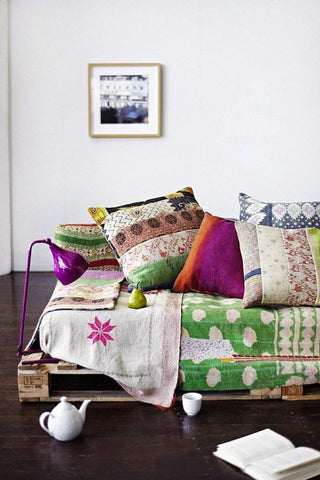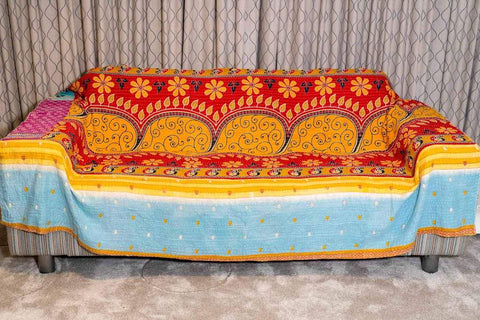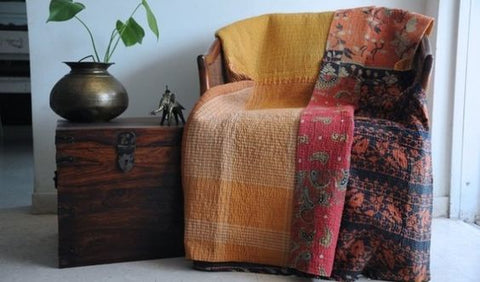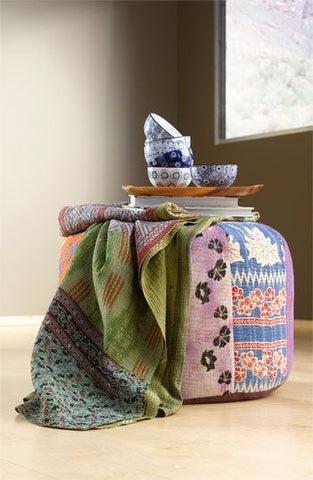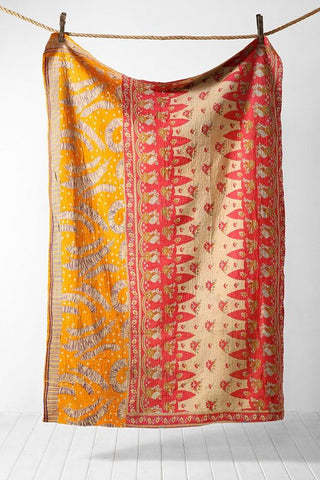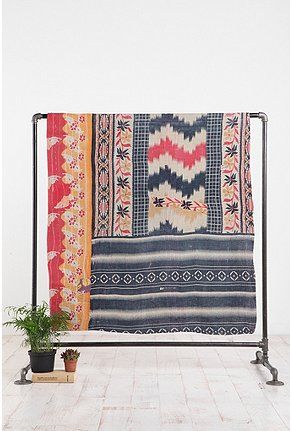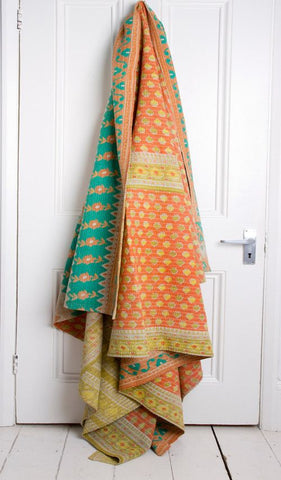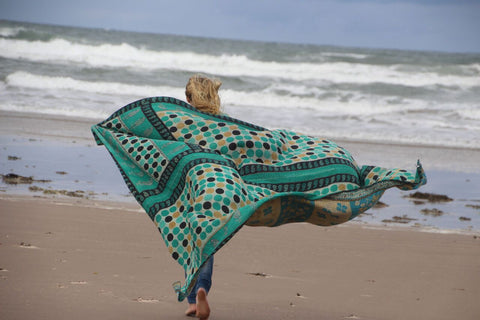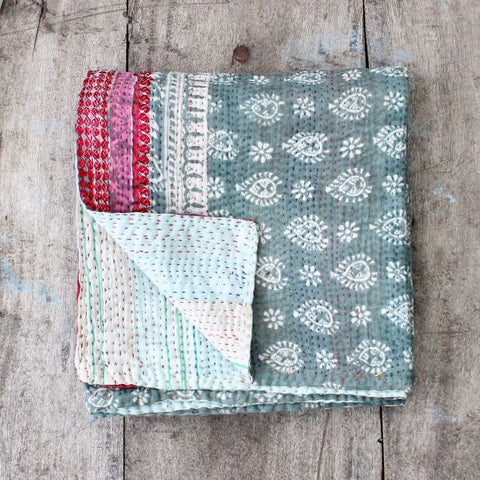Exquisite Kantha Quilts: Handcrafted Elegance for Your Home | Jaipur Handloom / kantha throws
The Art of Handstitched Kantha Quilts: A Beautiful Transformation of Upcycled Saris
Explore the exquisite world of Kantha quilts with Jaipur Handloom! Dive into our blog post, 'The Art of Handstitched Kantha Quilts: A Beautiful Transformation of Upcycled Saris,' and discover the rich heritage of Kantha craftsmanship. Immerse yourself in the beauty of handstitched quilts made from upcycled saris, expertly curated by Jaipur Handloom artisans. Embrace the timeless tradition of Kantha quilts, reimagined with sustainable practices and artistic finesse. Discover the perfect blend of heritage and innovation, only at Jaipur Handloom.
Read more →
Story Behind Kantha Quilts | Vintage Kantha Quilts and Throws
Kantha is the most prominent form of embroidery often practiced by rural women in east Asia, especially in India and Bangladesh. It is often used to make simple kantha quilts, also known as Nakshi Kantha.
The traditional form of Kantha embroidery are usually handmade or hand-woven with soft saris and dhotis,with a running stitch along the edges. The finished products are known as sujni Kantha or lep Kantha depending on the use of the finished product. The embroidery are sometimes made into scarves, bags, covers for mirror, boxes, pillows and even bed covers.
Vintage Kantha quilts are products of 2-3 layers recycled Indian vintage saris- this could either be in cotton fabric or silk. They are usually covered with running stitches, employing beautiful designs of flowers, birds, animals, shapes as well as designs from everyday activities.
The origin of handmade kantha quilts can be traced to some very resourceful women centuries ago. Poor women in rural area of west Bengal in India needed blankets for their babies, so they sourced for the softest parts of their old cotton saris and handmade them together with an all-over running stitches. This unique stich came to be known as kantha, and this brought about the advent of handmade Kantha quilts. The best aspect of vintage or handmade Kantha quilts is how easy it is to repair patches, especially their loose and uneven threads that adds immense character to the throws. This completely hand-weaven vintage Kantha throws are such a beautiful and refreshing break from the mass produced machine made products.
This beautiful handcraft has gained more international recognition and acceptance as it portrays the beauty of India craftsmanship. However, there are various types of kantha quilts;
1. Lep kantha quilts
The lep Kantha quilt is a much larger type of quilt used mostly during the winter season, in places with more severe winter experience, The lep Kantha quilt is mostly made up of 7 layers. Lotus is usually the central motif with the other designs coming up in small sewn stitches to present a wavy surface. It is also called lahari, lahari is known toean waves. The lep kantha quilts often has geometric patterns or designs. Motif designs of plants and trees can be prominently seen.
2. Sujni Kantha quilts
The prominent sujni kantha quilt is generally four and a half feet wide and six feet long in measurement. It is often used as bedspread for guests to sit or lie on . just like the lep kantha quilts, the sujni kantha quilts equally usually have a lotus motif in the center,border designed with different kinds of plants and flowers. It reflects the rich art of Bengal embroidery. The sujni kantha can be classified into two categories. The anchal bunani where designs resemble the end of a sari, then there is the Dorokha kantha,design also appear in identical form in the back of the kantha quilting making it a reversible kantha quilt.
3. Asian kantha quilting
This is usually used during functions for guest to sit. In Bangladesh it is also also known as khat or bed kantha, khat means bed. In other words it could be referred to as blanket size kantha quit, its motif are related to religious belief.
4. Shawl kantha quilt
This kantha quilt is usually used to wrap the body and has only two layers of fabric and its motif is dotted with flowers and plants in the center and rows of decorative embroidery along the border.
Indian kantha quilts is today being appreciated around the world for its beauty and uniqueness. Shop these adorable Cotton Kantha quilts.
Read more →
Kantha is the most prominent form of embroidery often practiced by rural women in east Asia, especially in India and Bangladesh. It is often used to make simple kantha quilts, also known as Nakshi Kantha.
The traditional form of Kantha embroidery are usually handmade or hand-woven with soft saris and dhotis,with a running stitch along the edges. The finished products are known as sujni Kantha or lep Kantha depending on the use of the finished product. The embroidery are sometimes made into scarves, bags, covers for mirror, boxes, pillows and even bed covers.
Vintage Kantha quilts are products of 2-3 layers recycled Indian vintage saris- this could either be in cotton fabric or silk. They are usually covered with running stitches, employing beautiful designs of flowers, birds, animals, shapes as well as designs from everyday activities.
The origin of handmade kantha quilts can be traced to some very resourceful women centuries ago. Poor women in rural area of west Bengal in India needed blankets for their babies, so they sourced for the softest parts of their old cotton saris and handmade them together with an all-over running stitches. This unique stich came to be known as kantha, and this brought about the advent of handmade Kantha quilts. The best aspect of vintage or handmade Kantha quilts is how easy it is to repair patches, especially their loose and uneven threads that adds immense character to the throws. This completely hand-weaven vintage Kantha throws are such a beautiful and refreshing break from the mass produced machine made products.
This beautiful handcraft has gained more international recognition and acceptance as it portrays the beauty of India craftsmanship. However, there are various types of kantha quilts;
1. Lep kantha quilts
The lep Kantha quilt is a much larger type of quilt used mostly during the winter season, in places with more severe winter experience, The lep Kantha quilt is mostly made up of 7 layers. Lotus is usually the central motif with the other designs coming up in small sewn stitches to present a wavy surface. It is also called lahari, lahari is known toean waves. The lep kantha quilts often has geometric patterns or designs. Motif designs of plants and trees can be prominently seen.
2. Sujni Kantha quilts
The prominent sujni kantha quilt is generally four and a half feet wide and six feet long in measurement. It is often used as bedspread for guests to sit or lie on . just like the lep kantha quilts, the sujni kantha quilts equally usually have a lotus motif in the center,border designed with different kinds of plants and flowers. It reflects the rich art of Bengal embroidery. The sujni kantha can be classified into two categories. The anchal bunani where designs resemble the end of a sari, then there is the Dorokha kantha,design also appear in identical form in the back of the kantha quilting making it a reversible kantha quilt.
3. Asian kantha quilting
This is usually used during functions for guest to sit. In Bangladesh it is also also known as khat or bed kantha, khat means bed. In other words it could be referred to as blanket size kantha quit, its motif are related to religious belief.
4. Shawl kantha quilt
This kantha quilt is usually used to wrap the body and has only two layers of fabric and its motif is dotted with flowers and plants in the center and rows of decorative embroidery along the border.
Indian kantha quilts is today being appreciated around the world for its beauty and uniqueness. Shop these adorable Cotton Kantha quilts.
What is Kantha? | History of Kantha | Untold Story of Vintage Kantha Quilt
With countless blankets that we refer to as “kantha throws”, “kantha quilts“, “indigo kantha”, or “kantha blankets“, you might simply awe, what is kantha? and often wondered to know more about – History of Kantha –
Kantha (simply means : “patched cloth”) refers to both the tradition of producing these unique, colorless quilted blankets (making something useful and alluring out of discarded and unused items), as well as the craft and stitch itself (a small, straight running stitch specially in Bengali embroidery).
WHERE DOES ORIGINAL KANTHA ORIGINATE?
Kantha is a classical type of embroidery native to eastern South Asia, in particular Bangladesh and the neighbouring Indian states of West Bengal and Odisha, along the Bay of Bengal. For this logic, it is treated a craft of the Bengal region (“Bengali”), which is not the same as Bangladeshi (meaning, of the country of Bangladesh).
All of our kantha blankets are hand-stitched in Bengal, India. Formally, it is pronounced KAHN-taa, (nevertheless we will unofficially continue to incorrectly call it “can-tha”).
For as many as 500 centuries, impoverished Bengali women have taken their discarded cloth scraps and sewn them together with a simple running stitch; taking the old and reimposing it into something useful and possessive. Far from trend-setting, or even artfulness, kantha was constructed originally for the most basic and practical aspiration: to keep warm.
Over time, kantha developed as a generational artistry, a craft that could symbolically impart story, desire, and well-wishing for loved ones & gift recipients. Elaborate kantha were made as wedding gifts or gifts for mothers and for generations, with stories, history and wishes weaved in, allowing illiterate women to leave a eternal mark.
Kantha Today :
Today, the rich tradition of kantha has attained popularity in the West; no surprise, given the beauty, intricacy, and “wow” factor of each piece.
As we culturally trend away from disposable consumer goods, and en-route meaningful, well stitched goods with a low environmental buffet, Kantha blankets happily fit the bill.
The cloth is repurposed, which means no new dyes or inks (except for the environmentally happy natural indigo blankets), no by-products of production; the only factory-produced supplies we use are thread and new, undyed, natural cotton (for our modern quilts).
Our kantha blankets — sometimes called sari quilts or homemade quilts— are not made of rugs, nor do they feature deliberately designed stitch patterns. But, they are indeed formed and fashioned from old cloth that has been junked and is ready for new life.
Our “special” silk-blend blankets are made from silk-blend cloth discarded by the producers for flaws, colour variation, out-dated arrangement, or as remnants. All the cloth that makes kantha blankets sold at Jaipur Handloom is sourced mainly in West Bengal.
All of vintage kantha quilts & other goods are made at Jaipur Handloom has following features:
Thickness: Each layer of sari cloth is very thin (imagine a soft muslin for a baby swaddle), so if there are only 2, the blanket will be very light. The standard one is 3 layered. This is the most common thickness in the native regions, but region where cold in heavy there generally 6 layered are used to keep the body warm.
Our kantha quilts are made with 3 layers of sari cloth. We also accept customized orders where we construct quilts based on requirement of customers – pattern ,size and other. The final product is still not bulky, but definitely as “robust” as kantha come. They are light weighted, but provide a good warmth, as well. (Any kantha made with new cloth, like our modern paisley, fruit and floral blanket, have additional thickness & weight) and are accepted worldwide.
Stitching : How heavy do you expect the running stitches to be? A blanket with very tight, close stitching will have a more stark, generous feel than stitching that is farther apart.
Edge Stitching : This is where a more inexpensively produced, lower quality kantha will divulge itself. A well-made kantha should have a straight edge, with a kantha stitch right up to the edge, hinder any erode or interior cloth coming out.
Our kantha are stitched with rigor all around!
Color / Fading : Keep in mind that if a kantha quilt features faded or very pastel colors, it is more likely that the fabric has been more frequently washed, or is old; the fibres may break down more quickly than other fabrics. Consider this as uniqueness and charm as these are rare. Women in Bengal (who are originally wearing these saris) love different color & vibrance, so these are what you will (should) mostly find with authentic kantha blankets.
Cost : Of course, we are all cost-conscious. But, there is a large amount of labour involved in generating even a single kantha throw. Our kantha throws take, on average, 24-48 hours to handcraft and for final finish. Our kantha blankets are all made in a generous, safe, whole-hearted business by vulnerable & at-risk women who can work with dignity and work to earn livelihood.
We have a strong belief from our products and are confident that you won’t find a kantha that is as unique, colourful, versatile, rich in story, or as well-constructed as our hand-stitched kantha quilts.
Contact us to know more about patterns and vibrant colors of kantha quilts and other kantha handmade products
Read more →
With countless blankets that we refer to as “kantha throws”, “kantha quilts“, “indigo kantha”, or “kantha blankets“, you might simply awe, what is kantha? and often wondered to know more about – History of Kantha –
Kantha (simply means : “patched cloth”) refers to both the tradition of producing these unique, colorless quilted blankets (making something useful and alluring out of discarded and unused items), as well as the craft and stitch itself (a small, straight running stitch specially in Bengali embroidery).
WHERE DOES ORIGINAL KANTHA ORIGINATE?
Kantha is a classical type of embroidery native to eastern South Asia, in particular Bangladesh and the neighbouring Indian states of West Bengal and Odisha, along the Bay of Bengal. For this logic, it is treated a craft of the Bengal region (“Bengali”), which is not the same as Bangladeshi (meaning, of the country of Bangladesh).
All of our kantha blankets are hand-stitched in Bengal, India. Formally, it is pronounced KAHN-taa, (nevertheless we will unofficially continue to incorrectly call it “can-tha”).
For as many as 500 centuries, impoverished Bengali women have taken their discarded cloth scraps and sewn them together with a simple running stitch; taking the old and reimposing it into something useful and possessive. Far from trend-setting, or even artfulness, kantha was constructed originally for the most basic and practical aspiration: to keep warm.
Over time, kantha developed as a generational artistry, a craft that could symbolically impart story, desire, and well-wishing for loved ones & gift recipients. Elaborate kantha were made as wedding gifts or gifts for mothers and for generations, with stories, history and wishes weaved in, allowing illiterate women to leave a eternal mark.
Kantha Today :
Today, the rich tradition of kantha has attained popularity in the West; no surprise, given the beauty, intricacy, and “wow” factor of each piece.
As we culturally trend away from disposable consumer goods, and en-route meaningful, well stitched goods with a low environmental buffet, Kantha blankets happily fit the bill.
The cloth is repurposed, which means no new dyes or inks (except for the environmentally happy natural indigo blankets), no by-products of production; the only factory-produced supplies we use are thread and new, undyed, natural cotton (for our modern quilts).
Our kantha blankets — sometimes called sari quilts or homemade quilts— are not made of rugs, nor do they feature deliberately designed stitch patterns. But, they are indeed formed and fashioned from old cloth that has been junked and is ready for new life.
Our “special” silk-blend blankets are made from silk-blend cloth discarded by the producers for flaws, colour variation, out-dated arrangement, or as remnants. All the cloth that makes kantha blankets sold at Jaipur Handloom is sourced mainly in West Bengal.
All of vintage kantha quilts & other goods are made at Jaipur Handloom has following features:
Thickness: Each layer of sari cloth is very thin (imagine a soft muslin for a baby swaddle), so if there are only 2, the blanket will be very light. The standard one is 3 layered. This is the most common thickness in the native regions, but region where cold in heavy there generally 6 layered are used to keep the body warm.
Our kantha quilts are made with 3 layers of sari cloth. We also accept customized orders where we construct quilts based on requirement of customers – pattern ,size and other. The final product is still not bulky, but definitely as “robust” as kantha come. They are light weighted, but provide a good warmth, as well. (Any kantha made with new cloth, like our modern paisley, fruit and floral blanket, have additional thickness & weight) and are accepted worldwide.
Stitching : How heavy do you expect the running stitches to be? A blanket with very tight, close stitching will have a more stark, generous feel than stitching that is farther apart.
Edge Stitching : This is where a more inexpensively produced, lower quality kantha will divulge itself. A well-made kantha should have a straight edge, with a kantha stitch right up to the edge, hinder any erode or interior cloth coming out.
Our kantha are stitched with rigor all around!
Color / Fading : Keep in mind that if a kantha quilt features faded or very pastel colors, it is more likely that the fabric has been more frequently washed, or is old; the fibres may break down more quickly than other fabrics. Consider this as uniqueness and charm as these are rare. Women in Bengal (who are originally wearing these saris) love different color & vibrance, so these are what you will (should) mostly find with authentic kantha blankets.
Cost : Of course, we are all cost-conscious. But, there is a large amount of labour involved in generating even a single kantha throw. Our kantha throws take, on average, 24-48 hours to handcraft and for final finish. Our kantha blankets are all made in a generous, safe, whole-hearted business by vulnerable & at-risk women who can work with dignity and work to earn livelihood.
We have a strong belief from our products and are confident that you won’t find a kantha that is as unique, colourful, versatile, rich in story, or as well-constructed as our hand-stitched kantha quilts.
Contact us to know more about patterns and vibrant colors of kantha quilts and other kantha handmade products
8 Reason why kantha quilts are so special and Why we love'em | Jaipur Handloom
These kantha quilts has multi-usage, these can be used as a bed cover as well as a throw over a sofa or chair, cushion covers, curtain, mobile holder and has other many more usage. The layering depends on the requirement. Sometimes, it's just 2 layered and can goes upto 8-9 layers.
Read more →
5 Reasons to Get Addicted to Kantha Quilts | Jaipur Handloom
With their whimsical fabrics and uneven stitching, kantha throws are fun, colorful accessories. Yet like other quilting traditions, the art form has rich cultural roots. For centuries in India and Bangladesh, Bengali women stitched together old saris and cloth scraps to form blankets and cushions. “Kantha” is the Sanskrit word for rags, and old cloth was believed to provide protection from harm.
- A Sanskrit proverb—“Slowly one stitches rags, slowly one traverses the path, and slowly one climbs to the top of the mountain”—connects the craft to the deities Chindadeo and Chindadevi, the Lord and Lady of Tatters.
- Kantha is actually a form of embroidery, sometimes used to depict symbols of nature like the sun or the tree of life.
- Although a simple running stitch is most familiar in today’s imports, women also created elaborate patterns that told family stories—as did African and early American quilters.
- Sometimes several generations of women would work on the same heirloom quilt.
- Both sides of a kantha quilt are equally decorative but not identical.
- Kantha cloth is often made into tablecloths, pillow covers, scarves, and bags, as well as quilts.
- Authentic kantha throws are handmade and will vary in size, color, and pattern.
Whether you’d like to embellish an existing color scheme in a sophisticated living space or create a more relaxed bohemian vibe – here’s five reasons you need to get yourself a Kantha quilt to bring some light, history and fun into your life!
- BED SPREAD, QUILT OR COVERLET
Probably the most common modern use for the Kantha quilt – they’re great all year ’round. Wonderful layered, for that true ‘boho’ look, they can provide instant warmth on those chilly nights, but they can also be light enough to use in warmer months if they have more delicate cotton layers.
- CURTAINS OR ROOM DIVIDER
Simply adding curtain clips along any edge of a kantha quilt can instantly turn it into a wonderfully colorful curtain or room divider – with a hippie Indian tapestry vibe. Here at Jaipur Handlom we like to keep open-minded and let you decide what uses you can get out of our beautiful range of kantha quilts and blankets, leaving them untouched, as-is.
- COUCH THROW OR BLANKET
Another favorite in our home is a couch throw – whether it’s literally thrown onto the couch to give a much needed splash of color or pattern, neatly folded or hung on the back of the sofa or armrest, the Kantha throw can be used to liven up a couch or as a blanket for snuggling up under (with popcorn of course)!
Alternatively, a fun weekend break from night re-runs of Friends or Breaking Bad could have you set up some floor cushions and layer them with kantha quilts for a romantic setting. Perfect for that cheeky glass of wine and Indian curry you’ve been dreaming about all week.
- WALL HANGING AND TAPESTRY
Kanthas make great wall hangings and can be an incredible talking piece for a lounge feature – or even an office space. The best thing about it is the 2-in-1 feature of the kantha – as they are double-sided they can be flipped creating a dynamic wall space!
- PICNIC BLANKET
Our favourite use of these gorgeous colorful kantha's is the picnic blanket. Kanthas are the ultimate picnic blanket – versatile, colourful and even reversible – so you really get a choice of 2 designs each time! Light enough to carry or stash in your bike basket, you’ll be the envy of all the other plain plaid blanket owners in your local park. You can keep a small kantha rolled up in your glove compartment for the impromptu country picnic getaway at any time, you can even have an indoor picnic in the middle of your lounge
Shop now for Kantha Quilts, throws, or buy a Kantha Blankets.
Read more →
With their whimsical fabrics and uneven stitching, kantha throws are fun, colorful accessories. Yet like other quilting traditions, the art form has rich cultural roots. For centuries in India and Bangladesh, Bengali women stitched together old saris and cloth scraps to form blankets and cushions. “Kantha” is the Sanskrit word for rags, and old cloth was believed to provide protection from harm.
- A Sanskrit proverb—“Slowly one stitches rags, slowly one traverses the path, and slowly one climbs to the top of the mountain”—connects the craft to the deities Chindadeo and Chindadevi, the Lord and Lady of Tatters.
- Kantha is actually a form of embroidery, sometimes used to depict symbols of nature like the sun or the tree of life.
- Although a simple running stitch is most familiar in today’s imports, women also created elaborate patterns that told family stories—as did African and early American quilters.
- Sometimes several generations of women would work on the same heirloom quilt.
- Both sides of a kantha quilt are equally decorative but not identical.
- Kantha cloth is often made into tablecloths, pillow covers, scarves, and bags, as well as quilts.
- Authentic kantha throws are handmade and will vary in size, color, and pattern.
Whether you’d like to embellish an existing color scheme in a sophisticated living space or create a more relaxed bohemian vibe – here’s five reasons you need to get yourself a Kantha quilt to bring some light, history and fun into your life!
- BED SPREAD, QUILT OR COVERLET
Probably the most common modern use for the Kantha quilt – they’re great all year ’round. Wonderful layered, for that true ‘boho’ look, they can provide instant warmth on those chilly nights, but they can also be light enough to use in warmer months if they have more delicate cotton layers.
- CURTAINS OR ROOM DIVIDER
Simply adding curtain clips along any edge of a kantha quilt can instantly turn it into a wonderfully colorful curtain or room divider – with a hippie Indian tapestry vibe. Here at Jaipur Handlom we like to keep open-minded and let you decide what uses you can get out of our beautiful range of kantha quilts and blankets, leaving them untouched, as-is.
- COUCH THROW OR BLANKET
Another favorite in our home is a couch throw – whether it’s literally thrown onto the couch to give a much needed splash of color or pattern, neatly folded or hung on the back of the sofa or armrest, the Kantha throw can be used to liven up a couch or as a blanket for snuggling up under (with popcorn of course)!
Alternatively, a fun weekend break from night re-runs of Friends or Breaking Bad could have you set up some floor cushions and layer them with kantha quilts for a romantic setting. Perfect for that cheeky glass of wine and Indian curry you’ve been dreaming about all week.
- WALL HANGING AND TAPESTRY
Kanthas make great wall hangings and can be an incredible talking piece for a lounge feature – or even an office space. The best thing about it is the 2-in-1 feature of the kantha – as they are double-sided they can be flipped creating a dynamic wall space!
- PICNIC BLANKET
Our favourite use of these gorgeous colorful kantha's is the picnic blanket. Kanthas are the ultimate picnic blanket – versatile, colourful and even reversible – so you really get a choice of 2 designs each time! Light enough to carry or stash in your bike basket, you’ll be the envy of all the other plain plaid blanket owners in your local park. You can keep a small kantha rolled up in your glove compartment for the impromptu country picnic getaway at any time, you can even have an indoor picnic in the middle of your lounge
Shop now for Kantha Quilts, throws, or buy a Kantha Blankets.

